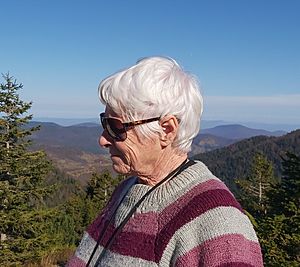Ewa Klonowski facts for kids
Quick facts for kids
Ewa Klonowski
|
|
|---|---|
 |
|
| Born |
Ewa Nowak
18 November 1946 Wrocław, Poland
|
| Nationality | |
| Citizenship | |
| Occupation | forensic anthropologist |
| Known for | responsible for the excavation and identification of over 2,000 victims in BiH |
| Spouse(s) | Ireneusz Klonowski |
| Honours | |
Ewa Elvira Klonowski (born 18 November 1946 in Wrocław, Poland) is a forensic anthropologist. She took political refuge in Iceland in 1981, following the declaration of martial law in the People's Republic of Poland. She has been living in Reykjavik, Iceland since 1982. In 1996, she began working on individual and mass graves exhumation in Bosnia and Herzegovina. Since then, she has been responsible for the excavation and identification of over 2,000 victims, and in 2005 she was nominated to the list of the 1,000 Women for the Nobel Peace Prize.
Biography
Dr. Klonowski has completed courses at the University of Bretagne Occidentale, Brest, France, and the Smithsonian Institution, Washington, D.C. She is a member of the American Academy of Forensic Sciences. In 1981, she became head of the laboratory at the Department of Pathology (Forensic Medicine Division), University of Iceland, Reykjavik.
In 1996, she began working for the International Criminal Tribunal for the former Yugoslavia (ICTY) and the Hague in 1996 on individual and mass graves exhumation in Bosnia and Herzegovina. Since then, she has worked with the Bosniak Commission on Missing Persons, Physicians for Human Rights, as director of the Monitoring Exhumations Project of International Forensic Program, and as a member of Forensic Experts Team of the State Commission for Tracing the Missing Persons, Bosnia-Herzegovina. In 2002, she was the only woman working for the International Commission on Missing Persons (ICMP), established by the Bosnian state in 1996. In 2007, she was working as a Senior Forensic Anthropologist for the International Commission on Missing Persons.
Work in Bosnia and Herzegovina
In 1996, Dr. Klonowski left her position as a specialist in paternity inquiries to work excavating mass graves throughout Bosnia. She returned by herself in again 1998, volunteering to work directly for Bosnian Muslims who, she says, "have the least money, and the most dead." The task she and her team face is far from simple, working in bombed-out clothing factories and other makeshift morgues. Of her work, she says, "I love bones; bones speak to me. I can look at some bones and I know what illnesses the person had, how he walked, how he liked to sit. I can determine nationality by bones. A Muslim’s femur is bent into a slight arc, because Muslims squat. Japanese have the same feature because they often kneel." Since beginning her work in Bosnia, Dr. Klonowski has played a critical role in helping many grieving families identify their missing loved ones.
Motivation
Klonowski explained to BBC that her interest in identifying the dead goes back to the exhumation of her grandfather from the Katyn Forest massacre in Poland, 1940. He was in the Polish Army reserve in 1939 and was sent to the east, where he was captured and later shot by the Russians. He was uncovered in the first exhumation. That event, she said, was what gave her the belief that relatives should have remains over which to mourn. "It is absolutely important and the same all over the world. When someone you love dies, you bury them or perhaps scatter the ashes (...) Our human reaction is to have a place to go and sit or pray or put a candle or a flower. It is exactly the same whatever religion." When the Bosnian war broke out in 1992, she was "...horrified. It was part of Europe. You saw the horse carts, the people on tractors, the burned houses. I felt I was totally useless as a human being. So when the war ended and there was talk of exhumation, this was something I could do."
Excavation
Klonowski's project, to attempt to exhume and identify all of the victims of the Bosnian war "was not an easy one to start nor has it been straightforward to carry out." The complexity of the job goes far beyond what the simplicity of the phrase "DNA" might suggest.
Dr Klonowski expects that completion of the excavation and identification process, if even possible, will take another 10 years, and she "intends to be there to see it through".
Conflict
Eva (Ewa) Klonowski first worked for the US-based Physicians for Human Rights, a contractor for the Yugoslav war crimes tribunal. From the start, her determination has clashed with lack of funding, indifferent governments, and ulterior political motives. In 2001, this led her to start working with the International Commission on Missing Persons, which aims identify the victims.
Impact
During her time in Bosnia, Dr Klonowski has identified more than two thousand family members.
The results of her work have immense promise for future identification of the victims of other mass disasters. Authorities in Thailand, for example, are trying to learn from her experience in the aftermath of the 2004 Indian Ocean Tsunami.
Honors
In 2002, Dr. Klonowski was awarded the Officer’s Cross of the Order of Merit of the Republic of Poland by President Aleksander Kwaśniewski
In 2005, her name was added to the list on a joint application called 1,000 Women for the Nobel Peace Prize.
She has also received honorary citizenship from the authorities of the Federation of Bosnia and Herzegovina.
In 2023, she received the Knight's Cross of the Order of the Falcon.

